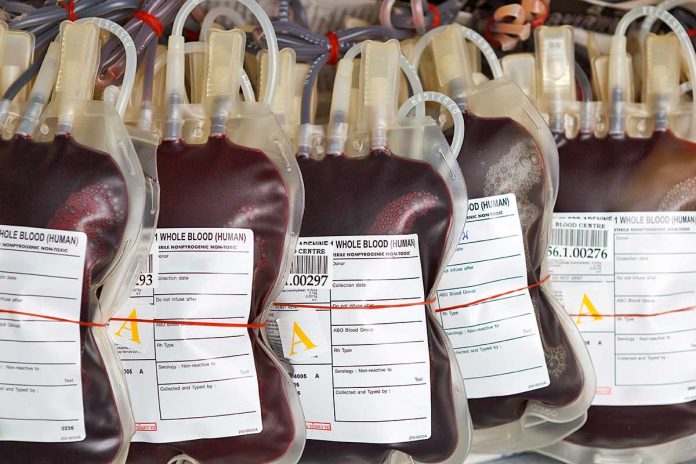The Food and Drug Administration on April 2 revised its recommendations for blood donations from men who have sex with men (MSM), lowering the deferral period from one year to three months. Within that deferral period, a man must have abstained from having sex with another man. The FDA instituted this change as the need for blood donations has increased due to the new coronavirus pandemic and subsequent cancellation of blood drives, an FDA spokesperson told PGN via email.
“The FDA is revising the 2015 recommendations for reducing the risk of HIV transmission by blood products to harmonize most behavior-based deferrals,” the spokesperson said in an email. “These recommendations focus on several areas of individual risk factors. In addition to MSM and women who have sex with MSM, the FDA concludes that a change to a recommended 3-month deferral is scientifically supported for individuals with recent tattoos and piercings, and people who have a past history of sex in exchange for money or injection drug use.”
Leaders in the LGBTQ+ community have responded to this change with mixed emotions.
“It’s about time they updated their policy; it’s been out of date for a long, long time,” said Coleman Terrell, director of the AIDS Activities Coordinating Office for the Philadelphia Department of Public Health, who lives with HIV. “It’s a good evidence-based decision by the FDA, and it’s looking at behaviors, not identities,” he added. “The three-month deferral is certainly much more simple, given the state of HIV-testing, than the 12-month deferral for men who have sex with men.”
“While this change by the FDA is a step in the right direction, it still bases itself in bias rather than science,” Human Rights Campaign President Alphonso David said in a press release. “This is progress from the FDA. But creating policy based on identity as opposed to risk is irrational and given the current COVID-19 crisis, it is more critical than ever to prioritize science and facts over fear and bias.”
Due to the current health crisis, the FDA implemented this revision to its Recommendations for Reducing the Risk of Human Immunodeficiency Virus Transmission by Blood and Blood Products “without prior public comment.” Each page of the document displays a header that reads “Contains Nonbinding Recommendations.”
“I think everything about the COVID epidemic highlights all the fractures and structural problems in our system,” Terrell said. “Irrational things like a 12-month deferral for gay men donating blood is now something that has to be addressed because we need blood. It’s sort of out of desperation on the federal level to finally remove a very stigmatizing policy.”
The American Red Cross on its website indicates that it supports the FDA’s change “as an important first step toward our greater goal of an inclusive and equitable blood donation process that treats all potential donors with equality and respect…” The same page bullet points the organization’s values, including the belief that “blood donation eligibility should not be determined by methods that are based upon sexual orientation.”
The FDA last updated its blood donor deferral recommendations for MSM in 2015, when it lifted the permanent ban for queer men and replaced it with a deferral period of one year. However, Terrell expressed that there are still unaddressed factors at play in terms of assessing MSM for HIV-free blood donations.
“The use of PrEP isn’t recognized,” Terrell said. “A lot of the advocates really think that a shorter deferral period, like about one month, and more [specificity] with the behavioral assessment might make more sense, ideally.”
Dr. Luis Montaner, the Herbert Kean, M.D., family professor and director of the HIV-1 Immunopathogenesis Laboratory at Wistar’s Vaccine and Immunotherapy Center, told PGN that he thinks the FDA’s recommendation should be directed toward individual risk instead of sexual orientation. The FDA created its original blood donation guidelines for MSM in the mid-1980s, when there were inadequate therapies and detection measures for people living with HIV, Montaner explained.
“I think a lot has changed since [the 1980s], and the guidelines have not been updated accordingly,” he said. “There are still gaps in what risk means to a person that is giving blood. A promiscuous heterosexual person would place a risk to the blood bank source in the same manner as a promiscuous gay person. [The FDA guideline] basically says, straight people have no risk — they can have all the partners they want, they can have all sorts of behavior they don’t need to disclose, but because they’re straight, it’s OK,” Montaner continued. “I think that doesn’t make any sense.”
The new FDA revisions are slated to stay in place after the pandemic subsides, the FDA spokesperson said in an email, but may change according to related comments that the administration receives.
“Additionally, the FDA remains committed to gathering the scientific data that can support donor deferral policies that are non-exclusive while maintaining a high level of blood safety,” the spokesperson said. “For example, the FDA is considering other than time-based deferral by generating the scientific evidence that will support an effective individual risk assessment-based blood donor questionnaire. In this regard, to investigate the scientific validity of such an approach, the FDA is working to obtain the necessary final approvals to commence a pilot study that will enroll about 2000 men who have sex with men who would potentially be willing to donate blood.”
